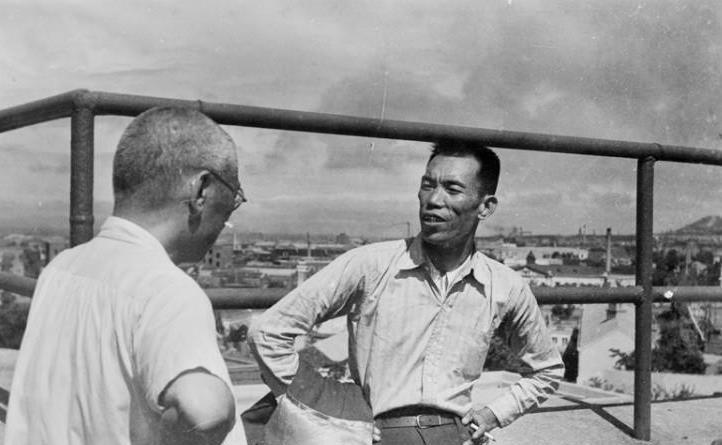Speaking of General Liang Xingchu, I believe that everyone knows more about the famous Commander of the Long Live Army. During the Period of the War to Resist US Aggression and Aid Korea, Liang Xingchu served as the commander of the 38th Army and became one of the first troops to enter the Korean War. Presumably, everyone knows that in the War to Resist US Aggression and Aid Korea, the disparity in strength between the two sides was very large, and the people's volunteer army faced an opponent this time by the US imperialists armed to the teeth. Even Lin Zong, who is known as the god of war, said that our army can still win a battle against Chiang Kai-shek's nationalist army, and it is undoubtedly an egg to touch a stone when it fights with the US army. In fact, Lin Zong's words are not to increase the morale of others and destroy their own prestige. Instead, it was assessed on the basis of the strength of both sides at the time.
It is enough to see that the War to Resist US Aggression and Aid Korea was an uphill battle, and the People's Volunteers must not only overcome the cold weather, but also face the enemy armed to the teeth, and at the same time, prevent enemy air raids. Because in the early days of the War to Resist US Aggression and Aid Korea, the People's Volunteer Army did not yet have air supremacy. However, it was under such conditions that the volunteer army, under the command of Mr. Peng, launched a large-scale battle with the enemy. Perhaps, in the first battle, the 38th Army led by Liang Xingchu played abnormally, lost its front hoof, did not fight well, and was reprimanded.

However, General Liang Xingchu, who knew shame and courage, boldly interspersed in the second battle, cut off the enemy's retreat, and after a fierce battle, the Thirty-eighth Army annihilated more than 7,000 enemy troops. It made an important contribution to the victory of the People's Volunteer Army in the second battle. When the good news of the Thirty-eighth Army reached the Volunteer Army Headquarters, Mr. Peng was very happy, and he added the title of Long Live Army to the telegram of the commendation of the 38th Army. As a result, the 38th Army gained, this resounding nickname, became the long-lived army in everyone's eyes.
In the subsequent battles, the 38th Army, under the leadership of commander Liang Xingchu, repeatedly made great contributions to the end of the War to Resist US Aggression and Aid Korea. As the commander of the Banzai Army, Liang Xingchu, after returning to China, naturally received the attention of the whole people and became the most popular and popular general star after the end of the Campaign to Aid Korea. Including today, as long as the Banzai Army is mentioned, the first impression in everyone's mind will be of the tiger general Liang Xingchu.
In fact, General Liang Xingchu was not only the commander of the Banzai Army, he was also the first commander of the ace 47th Army. Friends who may know history know that during the Liberation War, General Liang Xingchu was not the commander of the 38th Army, but the first commander of the 47th Army. At that time, the commander of the 38th Army was the Northeast Tiger General Li Tianyou, and our General Liang Xingchu was the first commander of the 47th Army.
The 47th Army was an ace force brought out by General Liang Xingchu, whose predecessor was the Tenth Column of the Northeast Field Army, and its commander was Liang Xingchu. In the famous Battle of Liaoshen, the Tenth Column participated in the Battle of Changchun, and together with the brother troops blocked Liao Yaoxiang's westward marching corps at Black Mountain and Dahu Mountain, winning valuable time for the main force of Dongye to annihilate the corps. In this blockade battle, the Tenth Column fully displayed its tenacious combat style and carried forward the revolutionary spirit of not being afraid of hardship and tiredness.
In November 1948, the 10th Column of the Northeast Field Army was reorganized into the 47th Army, and the commander of the army was General Liang Xingchu, the former commander of the column. The newly formed 47th Army participated in the Battle of Tianjin and the Battle of Western Hubei, and the main force behind it coordinated with the Third Corps of the Second Field Army to march southwest and participate in the Sichuan-Dongdong Campaign. From a certain point of view, the 47th Army also made a certain contribution to the liberation of the southwest.
After the end of the Liberation War, the 47th Army was stationed in Hunan and participated in the work of suppressing bandits in western Hunan Province. After the outbreak of the War to Resist US Aggression and Aid Korea, the 47th Army was incorporated into the 47th Army of the People's Volunteer Army and participated in the War to Resist US Aggression and Aid Korea, but the commander at this time was Cao Lihuai. Perhaps, the 47th Army's record on the battlefield of aiding Korea is not as good as that of the 38th Army, but it is also a brave and good fighting army in the volunteer army.
In 1954, the 47th Army was transferred back to China, stationed on the Leizhou Peninsula, and assumed the heavy responsibility of defending the border. In 1960, it was stationed in Hengyang, Hunan, in 1970 it was transferred to Shaanxi, and in 1985, the 47th Army was reorganized into the 47th Group Army, which was subordinate to the Lanzhou Military Region. From 85 to 87, the 47th Army, led by its commander Qian Shugen, participated in the Yunnan Border Sweeping Campaign and the Battle of Liangshan to defend the country.